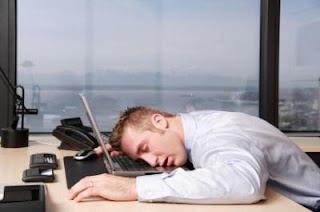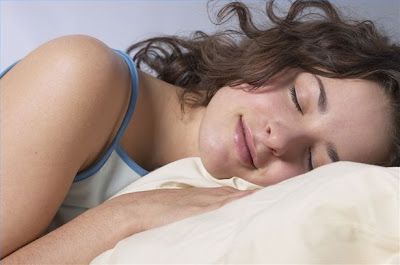While small children typically take naps in the afternoon, our culture
generally frowns upon mid-day sleep; however, even in those who get enough sleep
(but particularly in those who don’t), many people experience a natural increase
in drowsiness in the afternoon, about 8 hours after waking. And research shows
that you can make yourself more alert reduce stress and improve cognitive
functioning with a nap. Mid-day sleep, or a ‘power nap’, means more patience,
less stress, better reaction time, increased learning, more efficiency and
better health. Here’s what you need to know about the benefits of sleep and how
a power nap can help you!
These short 20-minute
power naps for people who are really engrossed in
their work, almost always provide a fresh burst of new ideas and energy. They
tend to eliminate the need for caffeine boosts during the workday. And, they
guarantee a reserve of energy so that the working day isn’t followed by an
evening in which he falls asleep on the couch watching TV or at a social
event.
Curling up in a sunny patch on the floor or even lying your head down on
your desk for a quick snooze brings relaxation. Research found that stress
hormone levels were lower in those who took stress-reducing actions such as
napping. Take a break each day from the stresses and reduce your risks, find a
quiet, comfortable spot and take a nap. Even a short power nap can leave you
feeling refreshed, renewed, and more focused.
If you have the opportunity for a power nap, particularly after a poor
night of sleep, by all means, take one. You will feel more alert and energetic
afterwards, and once rested after your mid-afternoon nap, your mood, efficiency,
and alertness level will improve greatly. Scientists have even proven that
taking a 20-minute nap approximately eight hours after you have awaken will do
more for your stamina than sleeping another 20 minutes in the morning. Of course
when you first come out of your afternoon nap, you will feel a bit groggy for
around ten minutes, but once your decline in motor dexterity dissipates, you
will reap the rewards of being well rested and ready to go for the rest of the
day.
Participants improved on the task throughout the first session. The
students’ speed and accuracy then leveled off during the second session. The
scores of the participants who didn’t nap declined throughout the final two
sessions. In contrast, volunteers who took a 20-minute power nap after
completing the second practice session showed no ensuing performance dips.
What’s more, 1-hour power nappers responded progressively faster and more
accurately in the third and fourth sessions. It looks like napping may protect
brain circuits from overuse until those neurons can consolidate what’s been
learned about a procedure.
In the crib, you had it made. Fuss a little and you got a breast in your
mouth. And when you weren't suckling, you were comatose—up to 18 hours a day.
Now? You sleep like a man—lousy. By the time you reach 20, that 18 hours is
slashed to 6. And as you age, the number shrinks even further.
Here's why: Inside every brain lurks the suprachias-matic nucleus, or
"internal clock." It knocks you out and wakes you up. At birth, it's set for
maximum crib time, but as you get older, the clock shifts your metabolism and
hormones in ways that deprive you of deep, dead-to-the-world sleep. Add that to
age-specific wake-up calls—alcohol when you're 20, kids when you're 30, your
bladder when you're 50—and your bed becomes bedlam. And that puts you in line
for any number of daylight nightmares, including high blood pressure, decreased
resistance to invading microbes, a compromised bodily repair and maintenance
system, and the tendency to fall asleep while the boss is talking, rather than
safely back at your desk. That's why we came up with decade-by-decade strategies
for dealing with life's worst sleep saboteurs.
The Four-Step Fix
1. Before you go to bed, pop some vitamin B5 (pantothenic acid). According
to Ron Klatz, M.D., president of the American Academy of Anti-Aging Medicine,
this is your antidote to too much cortisol, the stress hormone that surges in
middle-aged men. If that doesn't help, ask your doctor about taking some Bayer
with your B; aspirin may also help lower cortisol production.
2. Until you get your cortisol under control, it will limit your deepest
sleep, so you'll spend the night teetering on the edge of consciousness. Buy
stuff to screen out the distractions: specifically, MSA Safety Works foam
earplugs, a SleepMate white-noise generator, and Roc Lon blackout drapes. You'll
be less accessible than God.
3. Kids waking you up? Order a copy of Solving Your Child's Sleep Problems,
by Richard Ferber, M.D. It's knocked out generations of wakeful tots. If the
problem is an older child, take the TV out of his bedroom. A study at Brown
University showed a link between easy access to the tube and increased sleep
disturbances.
4. Go for a brisk six-block walk. According to University of Arizona
researchers, that's the amount of exercise that's best at reducing sleep
disruptions in men. (A regular workout program came in a close second.) Just do
it in the late afternoon, like when you get off work. This will cause your body
temperature to drop a few hours later, making you drowsy right before
bedtime.
Your 50s and beyond
Here's when it all comes apart. In the previously mentioned JAMA study, the
researchers found that after men turn 50, they get 28 minutes less sleep with
each decade that passes. "By the time men reach their 50s and 60s, they have
almost no deep sleep," says Sonia Ancoli-Israel, Ph.D., director of the Sleep
Disorders Clinic at the VA Medical Center in San Diego. A man in his 50s has
nighttime cortisol levels 12 times higher than when he was in his 30s. Nearly
one in 25 also has sleep apnea—a condition that interrupts normal breathing. And
then there's the expanding-prostate problem: A swollen gland may prevent you
from fully emptying your bladder, which means you'll make approximately 7,422
nightly trips to the toilet.
Contrary to popular opinion, napping isn’t for the lazy or depressed.
Famous nappers have included Bill Clinton, Lance Armstrong, Leonardo da Vinci
and Thomas Edison. The moral of the story: to be ultra-productive, just rest
your head. You snooze, you gain. Give it a try for yourself and see if you
aren’t amazed at the results!























